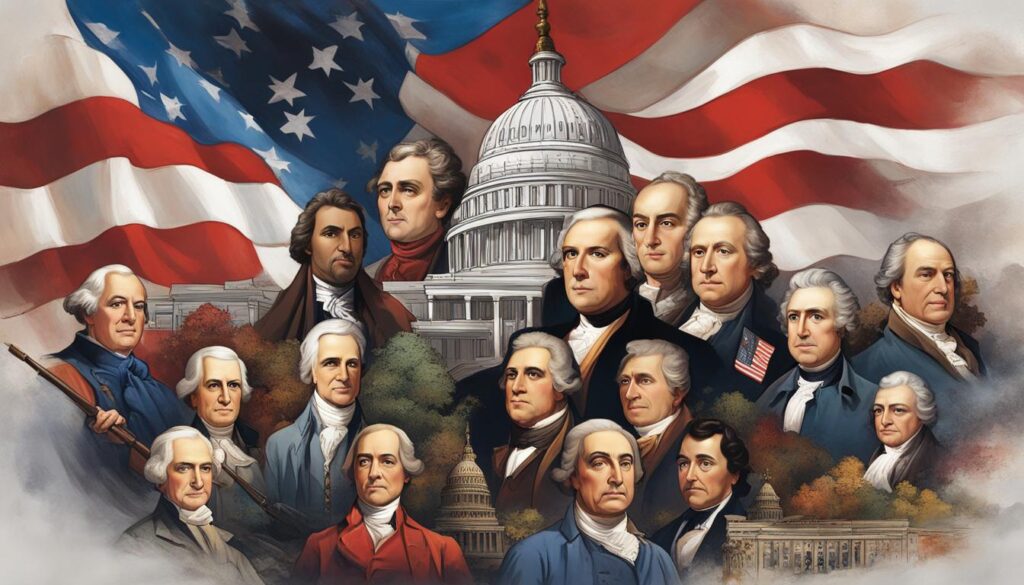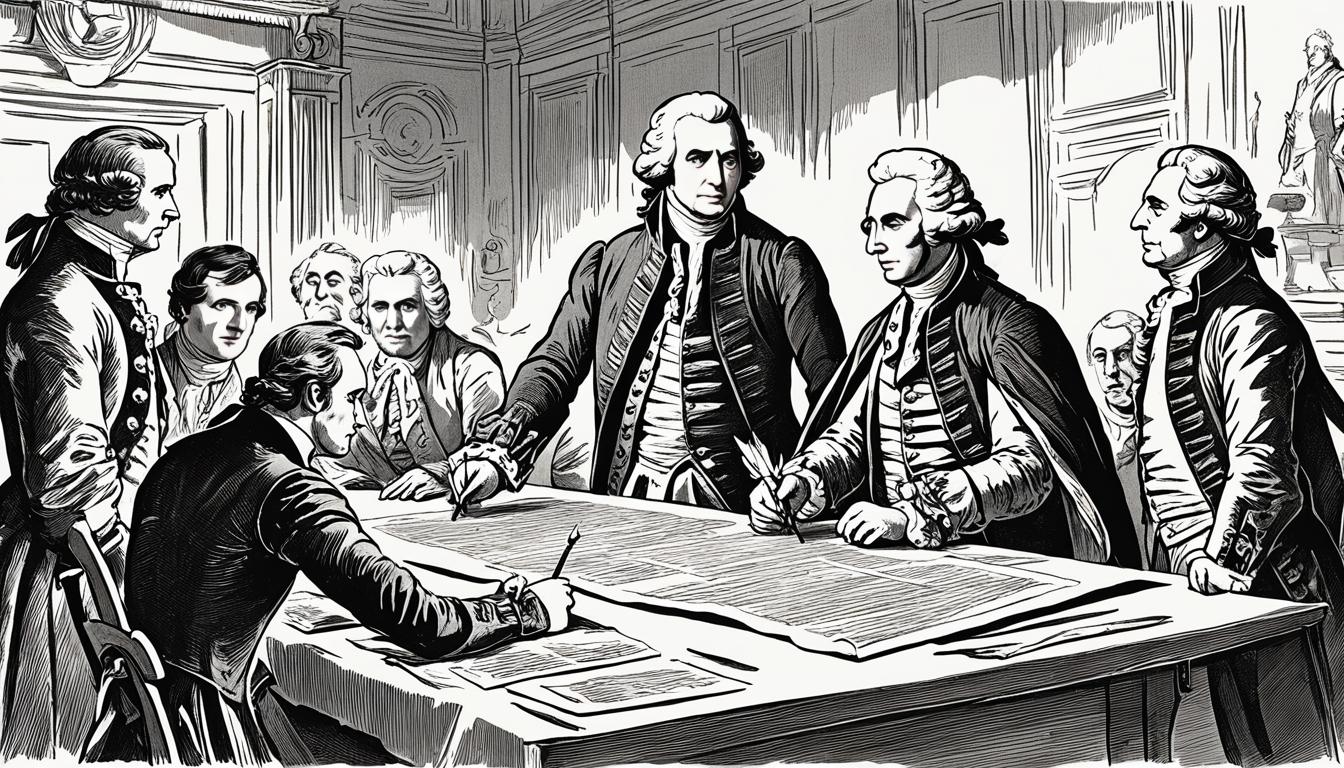“Founding Brothers: The Revolutionary Generation” by Joseph J. Ellis is a must-read for anyone interested in gaining insights into America’s early statesmen and the dynamics of the Revolutionary Generation. This book summary provides an overview of key themes and concepts presented in the book, including the individual backgrounds, motivations, and contributions of the Founding Fathers, the Revolutionary War, the birth of the United States as a nation and the challenges it faced.
The book also explores the formation of political parties, presidential leadership, the issue of slavery, and the lasting legacy of the Founding Brothers. Through this insightful analysis, Ellis offers a comprehensive understanding of the complexities of America’s founding era.
Key Insights
Joseph J. Ellis’ “Founding Brothers: The Revolutionary Generation” provides key insights into the dynamics of America’s early statesmen. The book explores the major themes and concepts of the Revolutionary Generation, emphasizing the importance of individuals and events in shaping the nation’s development.
“The founding generation put slavery on the path to ultimate extinction through the softening of American mores and attitudes that Jefferson called ‘a silent operation.’”
One of the key insights from the book is the focus on individual personalities and motivations of the Founding Fathers. Ellis presents them as real people, not just legendary historical figures. Their personal relationships and rivalries, as well as their political ideologies, played a crucial role in shaping the nation’s early years.
The book also highlights the significance of events like the Burr-Hamilton duel, demonstrating how even the smallest incidences can have far-reaching effects.
The table below summarizes the major themes and concepts presented in “Founding Brothers.”
| Theme | Description |
|---|---|
| Individualism | The book focuses on the personalities and motivations of America’s early statesmen |
| Interdependence | The Founding Fathers relied on each other to establish the foundation of the United States |
| Politics | The book examines the ideological differences that led to the formation of political parties in the early United States |
| Slavery | “Founding Brothers” addresses the contentious issue of slavery and its impact on the nation’s development |
“Founding Brothers” presents a compelling analysis of America’s early statesmen and provides valuable insights into the dynamics of the Revolutionary Generation.
The Founding Fathers
The Founding Fathers were a group of influential leaders who played a major role in the American Revolution and the formation of the United States. These men were instrumental in shaping the country’s early years and creating the political system that still exists today.
Some of the most well-known Founding Fathers include George Washington, Thomas Jefferson, Benjamin Franklin, Alexander Hamilton, and James Madison. Each of these individuals contributed in their own unique way, bringing their own perspectives and experiences to the table.
George Washington, for example, was the commander-in-chief of the Continental Army during the Revolutionary War. He later served as the first President of the United States, setting important precedents for future leaders to follow.
Thomas Jefferson is perhaps best known for his authorship of the Declaration of Independence, which outlined the principles that would guide the new country. He also served as the third President of the United States, further solidifying his place in American history.
Benjamin Franklin was a prominent figure in both the American Revolution and in early American politics. He was also a renowned inventor and scientist, known for his contributions to fields like electricity and meteorology.
Alexander Hamilton was a key figure in the establishment of the nation’s financial system. He served as the first Secretary of the Treasury and played a major role in shaping the country’s economic policies.
James Madison is often referred to as the “Father of the Constitution,” having played a major role in its creation and ratification. He later served as the fourth President of the United States, presiding over a period of significant expansion for the country.
These are just a few examples of the many individuals who helped to shape the United States in its early years. Each contributed in their own way, with their own unique strengths and weaknesses. Together, they helped to create a nation that would go on to become one of the most influential and powerful in the world.
The Revolutionary War
The Revolutionary War, also known as the American Revolution, was a significant event that shaped America’s early years. The war was fought between the thirteen colonies and Great Britain from 1775 to 1783.
Major key battles involved in the war were the Battle of Bunker Hill (1775), the Battle of Saratoga (1777), the Battle of Yorktown (1781), and others that were decisive in the war’s outcome. American strategists were George Washington and Marquis de Lafayette, who played crucial roles in the war’s success.
The Revolutionary War marked a turning point in American history by achieving independence from Great Britain. The conclusion of the war was marked by the signing of the Treaty of Paris in 1783, where Great Britain officially recognized the United States as a separate nation.
“We hold these truths to be self-evident, that all men are created equal, that they are endowed by their Creator with certain unalienable Rights, that among these are Life, Liberty and the pursuit of Happiness.” – Thomas Jefferson, Declaration of Independence
The Birth of a Nation
After the Revolutionary War, the United States faced significant challenges in establishing itself as a new nation. The Articles of Confederation, the nation’s first attempt at governing, proved inadequate, leading to the establishment of the Constitution. This founding document established a framework for the country’s governance and granted power to a central government while maintaining individual state autonomy.
The early struggles of governance were evident in the Whiskey Rebellion of 1791, a protest against a tax on distilled spirits. President George Washington’s response to the rebellion, in which he called upon state militias to aid in the suppression of the uprising, demonstrated the need for a strong central government.
The birth of the nation was not without its challenges, including those related to slavery. The issue of slavery threatened to tear the country apart, leading to debates and compromises such as the Three-Fifths Compromise included in the Constitution.
Despite these challenges, the United States continued to evolve and grow. Its early years were marked by debates and struggles as the country worked to establish its identity and place in the world.
“The Constitution is not an instrument for the government to restrain the people, it is an instrument for the people to restrain the government.” – Patrick Henry
The Main Events after the Revolutionary War
| Event | Date |
|---|---|
| Articles of Confederation ratified | 1781 |
| Shays’ Rebellion | 1786-1787 |
| Constitutional Convention | 1787 |
| Constitution ratified | 1788 |
| Whiskey Rebellion | 1791-1794 |
The above table highlights the main events that occurred after the Revolutionary War. These events reflect the challenges faced by the new nation and the efforts made to establish a framework for governance.
The birth of the United States was not without its difficulties, but it laid the foundation for a nation that would grow and evolve over time.
The Formation of Political Parties
The formation of political parties in early America was a significant development that emerged in the aftermath of the American Revolution. The ideological differences between the Federalists and Anti-Federalists created a deep divide in the newly-formed nation and shaped the political landscape for years to come.
The Federalists favored a strong central government, believing that it would promote stability and economic growth. In contrast, the Anti-Federalists were skeptical of centralized power and emphasized states’ rights and individual liberties.
“The division into parties is an evil which ought to be avoided, not an unavoidable evil for which we are to provide.” – Thomas Jefferson
The debates between the Federalists and Anti-Federalists revolved around key issues, such as the power of the federal government, the role of the judiciary, and the necessity of a bill of rights. These debates ultimately laid the foundation for the two-party system that persists in modern American politics.
The Election of 1796
The differences between the Federalists and Anti-Federalists became even more pronounced during the election of 1796, which saw John Adams, a Federalist, emerge as the winner over Thomas Jefferson, an Anti-Federalist. This election marked the first peaceful transfer of power between different political parties in world history and cemented the two-party system as a permanent fixture in American politics.
The Federalist Papers
Another important factor in the formation of political parties in early America was the publication of the Federalist Papers. The Federalist Papers were a collection of essays written by Alexander Hamilton, James Madison, and John Jay that argued for the ratification of the Constitution. They presented a vision of a strong central government and a system of checks and balances that would prevent the abuse of power.
The Federalist Papers were instrumental in shaping public opinion and laying the foundation for the Federalist Party, which supported the ratification of the Constitution and a strong central government.
The Legacy of Political Parties
The formation of political parties in early America played a critical role in shaping the nation’s history and political landscape. It gave rise to the two-party system that has endured for over two centuries and has contributed to the stability and continuity of American democracy. However, it has also led to partisan polarization and gridlock, highlighting the ongoing tension between individual and collective interests.
Presidential Leadership
Presidential leadership played a pivotal role in shaping the development of early America.
George Washington, the first president of the United States, set the standard for future presidents with his steadfast leadership during his two terms in office. His leadership during the American Revolution and his efforts to establish the presidency as an institution earned him the title “Father of His Country.”
John Adams, Washington’s successor, faced many challenges during his term, including strained diplomatic relations with France. Despite the difficulties, Adams remained committed to his principles and was instrumental in the passage of the Alien and Sedition Acts.
Thomas Jefferson, the third president, was known for his advocacy of individual liberties and a strict interpretation of the Constitution. Jefferson pursued an agenda of westward expansion and was responsible for the Louisiana Purchase.
James Madison, the fourth president, played a critical role in the War of 1812 and authored the first drafts of the Constitution and the Bill of Rights. His leadership helped establish the United States as a powerful nation on the global stage.
James Monroe, the fifth president, is best known for the Monroe Doctrine, which proclaimed that the Western Hemisphere was closed to further European colonization. This bold assertion of American power helped shape the course of international relations for decades to come.
Early presidential leadership in America was marked by a commitment to the principles upon which the nation was founded, a dedication to individual liberties, and a steady hand in the face of difficult challenges.
The Issue of Slavery
Slavery was a contentious issue in early America, with debates surrounding its morality and legality. The enslavement of Africans was deeply ingrained in American society, with slaves brought over as early as the 17th century to work on plantations and in households across the South. By the mid-19th century, over four million enslaved people made up nearly a third of the nation’s population.
Slavery had a significant impact on the nation’s development, shaping its economy and social structure. It fueled the growth of the cotton industry and contributed to the South’s dominance in agriculture. However, it also perpetuated a system of racial inequality and oppression, with slaves deprived of basic human rights and subject to brutal treatment.
Efforts to address the issue of slavery were met with resistance, with Southern states fiercely defending their right to own slaves. The issue came to a head during the Civil War, which was fought over the question of whether slavery should be abolished. The Union’s victory led to the passage of the 13th Amendment, which abolished slavery in the United States.
Despite the abolition of slavery, its legacy continues to shape American society today, with deep-seated racial inequalities and systemic racism still rampant. Recognizing the lasting impact of slavery is crucial to addressing these issues and working towards a more just and equitable society for all.
The Legacy of the Founding Brothers
More than two centuries after the Revolutionary Generation, the Founding Brothers continue to influence American politics, government, and society. Their impact can be seen in the enduring legacy of their ideas, ideals, and principles. As Joseph J. Ellis notes in his book, “Founding Brothers: The Revolutionary Generation,” these statesmen “created a system of government based on a strong central authority that nevertheless sought to preserve fundamental democratic principles.”
Their legacy can be seen in the enduring strength of American democracy, as well as in the ongoing debates and discussions surrounding the interpretation and implementation of the Constitution. The Founding Brothers also set a precedent for leadership that continues to inform our understanding of presidential leadership today.
Moreover, the Founding Brothers’ commitment to liberty and equality has served as a beacon of light and hope for oppressed and marginalized people around the world. Their legacy has inspired countless movements for civil rights, democracy, and freedom, serving as a testament to the enduring power of their ideas.

In conclusion, the legacy of the Founding Brothers is a testament to their enduring impact on American society and beyond. As we continue to grapple with the challenges of the present, we can look to their ideas and ideals as a source of strength and guidance as we seek to build a more perfect union.
Conclusion
In conclusion, “Founding Brothers: The Revolutionary Generation” by Joseph J. Ellis is a remarkable book that offers valuable insights into America’s early statesmen and the dynamics of the Revolutionary Generation. Ellis provides a comprehensive analysis of the major themes and concepts that shaped America’s early years, including the Founding Fathers, the Revolutionary War, the birth of a nation, the formation of political parties, presidential leadership, the issue of slavery, and the lasting legacy of the Founding Brothers.
The book summary provides readers with a concise overview of the major concepts, making it an essential read for those interested in understanding the complexities of America’s founding era. Overall, “Founding Brothers” is a must-read for anyone seeking to broaden their perspective on American history and the foundational ideas that laid the groundwork for the United States.



